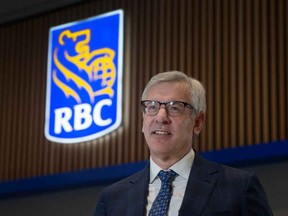Canada’s largest bank holds first Investor Day event since 2018
Article content
United States President Donald Trump’s tariffs have sparked fears of a recession in Canada, but this country’s largest bank is confident it can overcome any near-term hurdles and continue to post healthy growth during the next few years.
Article content
Article content
Royal Bank of Canada executives say that aside from focusing on acquiring more clients and cementing relationships in Canada as well as boosting its businesses globally, including in the U.S., the use of artificial intelligence will help “unlock” opportunities.
Advertisement 2
Article content
“Taking our strong digital, data and AI capabilities to the next level is such an important part of how we’ll continue to build the bank of the future and unlock our next phase of growth,” RBC chief executive Dave McKay said on Thursday at the bank’s first Investor Day event since 2018.
But he said the bank needs to adapt to “several macro forces of change,” such as the shift to “hyper-personalization and an AI arms race that every business needs to keep up with,” changing immigration dynamics and the backdrop of deglobalization and global tariffs.
“On one hand, we have lower interest rates in Canada to stimulate investments,” he said. “However, this is being offset to a degree by increased uncertainty created by tariffs and the impact that’s having on businesses and jobs.”
McKay said markets are strongly reacting to any kind of positive news because they sense opportunities and don’t want to get delayed in seizing them.
Article content
Advertisement 3
Article content
“Negative news causes a pause, but the positive news gets you encouraged again, and you move fast,” he said.
RBC had to put aside more-than-expected money for potentially bad loans in its first quarter, but a key reason why the lender easily beat analysts’ expectations was the performance of its personal business segment, which includes customers’ deposits and mortgages.
Erica Nielsen, group head of personal business, said the bank still expects the segment to grow, but consumers are being cautious as a result of the trade war threat.
She said there was a little bit more “buoyancy” in the mortgage market during the fall when interest rates were dropping and the equity markets were performing well, too, but people are now a bit more reluctant to put their money into the market until they get more specific guidance on tariffs.
Nevertheless, Nielsen said that there’s a “lot of pent-up demand” in the mortgage market, so she expects business to pick up as soon as there’s a “little bit more certainty.”
Advertisement 4
Article content
With so many renewals coming up in the next two years, she also expects “heightened competition” when it comes to the mortgage business.
“We want to have our sales forces out there competing to win that renewal,” she said.
Recommended from Editorial
Nielsen said it is too early to understand how the latest round of tariffs may impact Canadians and the bank’s personal business segment, but it does raise questions about employment and job losses.
“That would be the same trend that we were thinking about through COVID and coming out of the COVID period,” she said. “Any of these down cycle turns where there’s unemployment have implications on our business. That’s what we will be watching cautiously.”
• Email: nkarim@postmedia.com
Bookmark our website and support our journalism: Don’t miss the business news you need to know — add financialpost.com to your bookmarks and sign up for our newsletters here.
Article content
RBC says ‘AI arms race’ key to future growth
2025-03-28 12:38:50





